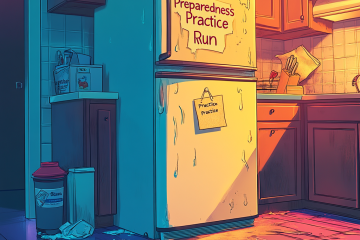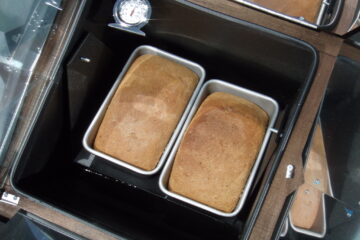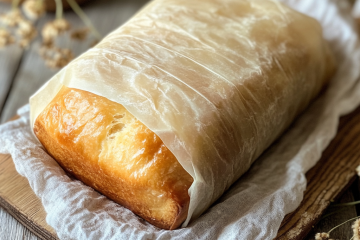
Sourdough is made without yeast
Budget-Friendly Prepping: Starting with the Bare Essentials
In an uncertain world, being prepared can provide peace of mind. However, for many, the idea of stockpiling supplies can seem overwhelming and expensive. The good news is that you can start your preparedness journey with just four basic items that won’t break the bank or take up much space. In fact, a year’s supply of these essentials for one person can fit under a twin-size bed, making it an ideal solution for those in small living spaces or on a tight budget.
Bare Minimum Food Preparedness
Let’s break down the bare minimum you need to keep yourself fed for a month:
- 27 pounds of whole grain (hard wheat, teff, spelt, or kamut) per month
- 3 pounds of honey per month
- 5 pounds of powdered milk per month
- 1 pound of salt per month
Multiply these amounts by 12, and you have your year’s supply. These quantities might seem daunting at first, but remember, they’re designed to sustain you in an emergency situation. The beauty of this approach is that you can start small, perhaps with a month’s supply, and gradually build up as your budget allows.
Why these four items? Whole grains provide the bulk of your calories and nutrients, offering complex carbohydrates, fiber, and some protein. (Separate the vital wheat gluten out and you can make protein packed wheat meat.) Honey serves as a natural sweetener and preservative, with the added bonus of never spoiling. Powdered milk brings essential protein and calcium to your diet, while salt is crucial for flavor and preserving food and stabilizing health, believe it or not.
Among these four basics, salt deserves special attention. Far more than just a flavor enhancer, salt plays a crucial role in our body’s functions. Sodium,
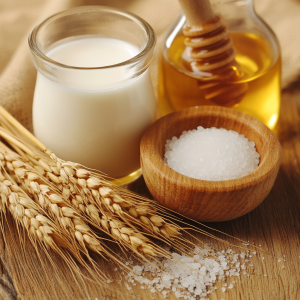
Wheat, Honey, Salt and Milk can allow you to survive for a year
the primary component of salt, is an essential electrolyte that helps maintain the proper balance of fluids inside and outside of body cells. This balance is vital for nerve impulse transmission, muscle function, and the regulation of blood pressure.
The cornerstone of your emergency diet will be bread made through the sourdough method as you won’t have any yeast. This ancient technique allows you to create nutritious, digestible bread without commercial yeast. (Sourdough is better for you than regular bread! Though you could always just make a flatbread.) To start your sourdough journey, mix equal parts whole grain flour and water in a jar, leave it at room temperature, and feed it daily with more flour and water. In about a week, you’ll have a bubbly, active starter ready for baking.
Your daily bread can be made by mixing flour, water, salt, and a portion of your sourdough starter. After kneading and rising, this simple dough transforms into a hearty loaf that can sustain you through challenging times. The sourdough process not only creates delicious bread but also makes the nutrients in the grain more bioavailable, maximizing the nutritional value of your limited ingredients.
When it comes to purchasing these essential items, knowing where to find the best deals can help stretch your preparedness budget even further. Here are some recommended sources for each of our four basic items:
Where to get your essential Food Storage Items:
Whole Grains: One of the best sources for bulk wheat is Provident Living (providentliving.org), run by the Church of Jesus Christ of Latter-day Saints (LDS Church) You can get it in 25 pound bags or in #10 cans. Don’t worry – you don’t need to be a member to purchase from them, and their prices are very competitive, especially for wheat.
For other grains, check out Azure Standard or local Amish stores if you have access to those.
Honey: For honey, consider checking out Costco. They typically offer large quantities of honey at reasonable prices, making it an excellent option for our preparedness needs.
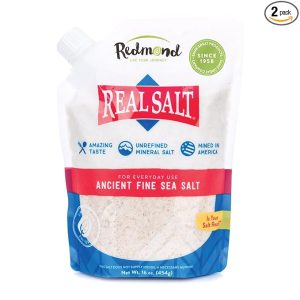
Redmond Salt RealSalt is strongly recommended
Salt: When it comes to salt, RealSalt from Redmond Salt is a high-quality option as it hasn’t been stripped of its other nutrients and sourdough bread does not like iodized salt. While it can be purchased directly from Redmond Salt, you can often find it on Amazon, which might be more convenient for some.
Powdered Milk: For the best price on powdered milk, the LDS Church’s Provident Living site is again a great resource. However, if taste is a priority for you, many preppers recommend the powdered milk from Thrive Life (www.thrivelife.com/prepardnesspro). While it might be a bit pricier, the improved taste could make a big difference in a long-term situation. They often have sales on their powdered milk. Keep an eye out.
Remember, prices and availability can vary, so it’s worth checking multiple sources and watching for sales. Buying in bulk when prices are low can help you build your supplies more economically over time.
While this basic stockpile ensures you won’t go hungry, it’s important to note that it’s just a starting point. As your budget and space allow, consider expanding your supplies to include a wider variety of foods. Dried beans, rice, and other grains can add variety and additional nutrients to your stockpile. Spices, some of your favorite foods, etc. You won’t need multi-vitamins if you sprout your grains. Learning to grow sprouts can provide fresh nutrients even in limited space.
Remember, the goal is to start somewhere, no matter how small. Even having a month’s supply of these basics puts you ahead in terms of preparedness. As you become more comfortable with the idea of prepping, you can gradually increase your supplies and expand your preparedness knowledge.
One of the greatest advantages of this approach is its space efficiency. A year’s supply of these staples for one person can fit under a twin-size bed, making it feasible even for those in small apartments or shared living situations. This compact nature of your supplies also makes it easier to keep your preparedness efforts private if you choose.
Prepping doesn’t have to be an all-or-nothing endeavor. Starting with these four basic items – whole grains, honey, powdered milk, and salt – provides a foundation of food preparedness that you can build upon over time. It’s a budget-friendly approach that doesn’t require a lot of space, making it accessible to almost everyone. Remember, the most important step in preparedness is simply to begin. With these basics in your pantry, you’re already on your way to greater self-reliance and peace of mind.
Please be sure to check out the Ten Principles of Preparedness as there are 7 other principles that have a higher priority than food and the first 4 you
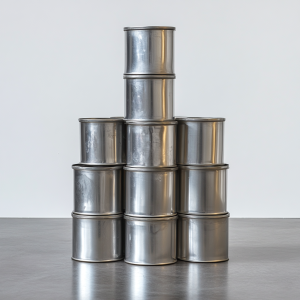
#10 cans are great for long term food preservation
can tackle without any budget whatsoever. So get ahead of the game that way.
